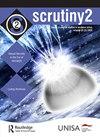Queer Cyborgs in South African Speculative Fiction: Moxyland by Lauren Beukes and The Prey of Gods by Nicky Drayden
IF 0.1
0 LITERATURE
Scrutiny2-Issues in English Studies in Southern Africa
Pub Date : 2020-05-03
DOI:10.1080/18125441.2020.1832561
引用次数: 1
Abstract
Abstract This article explores the image of the queer cyborg in two works of speculative fiction about South Africa, Lauren Beukes's Moxyland (Johannesburg: Jacana, 2008) and Nicky Drayden's The Prey of Gods (London: Harper Voyager, 2017). These queer cyborg characters inhabit imagined futures where the interface between human and technology is both a conduit for self-expression and a threat to their freedoms and lives. I use Donna Haraway's essay “A Cyborg Manifesto” (Simians, Cyborgs and Women: The Reinvention of Nature. New York: Routledge, 1991) as a queer theory to argue that the characters in these novels can use the human–machine interface to experience themselves more fully and to queer their environments. The characters become queer cyborgs who blur the boundaries between human/animal, human/machine, and physical/non-physical. However, the interface with technology in these novels also reinscribes the long history of violence and oppression suffered by queer people in South Africa and globally. I argue that the queer cyborg, although conceived in idealistic terms by some post-Harawayan theorists, represents the position of queer people as outsiders in South Africa, and that these novels offer important critical perspectives on what the future might hold for queer people as everyday life becomes more cyborgian. Technologies that might provide sites for social change and for redefining restrictive identity categories are simultaneously sites that bring new forms of manipulation, oppression, and control for the queer cyborg, and this figure can thus speak to present-day cyborgian experiences of queer people in South Africa.南非推理小说中的酷儿机器人:劳伦·贝克斯的《莫兰德》和妮基·德雷登的《众神的猎物》
摘要本文探讨了劳伦·贝克斯(Lauren Beukes)的《莫特兰》(Moxyland)(约翰内斯堡:贾卡纳,2008)和妮基·德雷登(Nicky Drayden)的《众神的猎物》(the Prey of Gods)(伦敦:Harper Voyager,2017)这两部关于南非的推理小说中的酷儿半机械人形象。这些古怪的半机械人角色生活在想象中的未来,在那里,人类和技术之间的界面既是自我表达的渠道,也是对他们自由和生命的威胁。我用Donna Haraway的文章《机器人宣言》(Simians,Cyborgs and Women:The Reinvention of Nature。纽约:劳特利奇,1991)作为一种酷儿理论,认为这些小说中的人物可以使用人机界面来更充分地体验自己,并对他们的环境进行酷儿化。这些角色变成了奇怪的半机械人,模糊了人/动物、人/机器和物理/非物理之间的界限。然而,这些小说中与技术的互动也再现了南非和全球酷儿遭受暴力和压迫的漫长历史。我认为,酷儿半机械人,尽管是一些后哈拉瓦理论家用理想主义的术语构想的,但代表了酷儿在南非作为局外人的地位,这些小说为酷儿的未来提供了重要的批判性视角,因为日常生活变得更加半机械化。可能为社会变革和重新定义限制性身份类别提供场所的技术,同时也为酷儿半机械人带来了新形式的操纵、压迫和控制,因此,这个数字可以讲述南非酷儿的现代半机械体验。
本文章由计算机程序翻译,如有差异,请以英文原文为准。
求助全文
约1分钟内获得全文
求助全文
来源期刊
CiteScore
0.50
自引率
0.00%
发文量
10
期刊介绍:
scrutiny2 is a double blind peer-reviewed journal that publishes original manuscripts on theoretical and practical concerns in English literary studies in southern Africa, particularly tertiary education. Uniquely southern African approaches to southern African concerns are sought, although manuscripts of a more general nature will be considered. The journal is aimed at an audience of specialists in English literary studies. While the dominant form of manuscripts published will be the scholarly article, the journal will also publish poetry, as well as other forms of writing such as the essay, review essay, conference report and polemical position piece. This journal is accredited with the South African Department of Higher Education and Training.

 求助内容:
求助内容: 应助结果提醒方式:
应助结果提醒方式:


